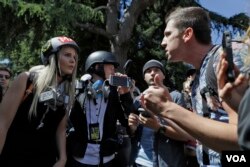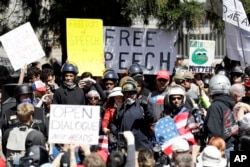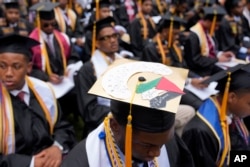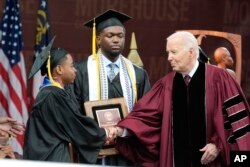Student Union
Free Speech on Campus Being Compromised, Students Say
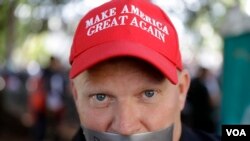
The testimony is in response to campus violence against controversial speakers, and “free speech zones” on at least one campus. Free speech zones are areas designated for protest on some campuses.
Testifying before the Senate Judiciary Committee, Zach Wood, a student at Williams College in Massachusetts, said he has seen “considerable backlash in addition to administrative obstacles” since becoming president of a group called Uncomfortable Learning. That group invites controversial guests to speak on campus.
He said he fears that students at many colleges are only hearing a single liberal opinion on many issues.
Isaac Smith, a former student at Ohio University, spoke of a friend who was threatened with arrest for gathering signatures outside of the school’s designated “free speech zone.”
“There have been multiple cases across the country where students have been prevented from distributing copies of the United States Constitution … outside of their schools’ misleadingly labeled ‘free speech zones,’" Smith said. “Taken together, we know that administrators nationwide are stifling free speech.”
Disagreements on speakers
The hearing comes after several high-profile incidents on college campuses across the country in which invited speakers were blocked from speaking by administrators or had their events interrupted by violent protesters.
The most recent incident came in April when the University of California-Berkeley canceled preemptively a scheduled speaking event by conservative commentator Ann Coulter, saying the school couldn't control any violence around Coulter.
Richard Cohen, president of the advocacy group Southern Poverty Law Center, told senators he has “sympathy for the educators’ impulse to protect,” and encouraged administrators to teach their students to “counter speech with speech.”
“They recognize that harm does not only come from physical violence, that trauma and terror can hurt as much as guns and fists,” he said.
A month before the Coulter incident, a group of about 200 students at Vermont's Middlebury College shouted down conservative author Charles Murray, refusing to let him speak. As Murray tried to leave campus, protesters jumped on his car and assaulted a professor who accompanied him.
Cohen’s organization has labeled Murray a “white nationalist,” based on his research into a potential link between race and intelligence. He told Senators on Tuesday that students and universities “should not give racists an audience.”
White nationalist activity
According to Cohen, the recent bouts of violence come “against a backdrop of increased white nationalist activity” on college campuses, and so, he says, “it comes as little surprise that we have seen a strong backlash among students.”
“Since the spring of 2016, we have documented approximately 250 incidents — on more than 150 campuses — in which racist flyers were distributed. Nearly 200 of these incidents occurred after the November election,” he said.
Sen. Chuck Grassley, chairman of the judiciary committee, said he believes free speech is being “sacrificed at the altar of political correctness.”
“Many administrators believe that students should be shielded from hate speech, whatever that is, as an exception to the First Amendment,” he said. “Unfortunately, this censorship is no different from any other examples in history, when speech that authorities deemed to be heretical has been suppressed based on its content.”
Grassley said he is concerned school administrators will “take the easy route of giving in to student pressure to restrict debate,” but he said he was encouraged by schools like the University of Chicago, which recently adopted a policy to prohibit administrators from suppressing speech on campus that some find offensive or immoral.
“It calls for counter-speech rather than suppression by people who disagree with speech,” said Grassley.
VOA's Bruce Alpert contributed to this report.
Please leave a comment here, and visit us on Facebook, Twitter, Instagram and LinkedIn, thanks!
See all News Updates of the Day
- By VOA News
Siblings flourish at University of Cincinnati
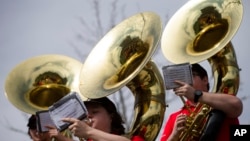
Two sets of siblings -- on from Kuwait and one from Saudi Arabia -- talk about their experiences as international students at the University of Cincinnati in the U.S. state of Ohio.
Read the story here. (April 2024)
Pro-Palestinian protesters set up a new encampment at Philadelphia's Drexel University

Pro-Palestinian protesters set up a new encampment at Drexel University in Philadelphia over the weekend, prompting a lockdown of school buildings, a day after authorities thwarted an attempted occupation of a school building at the neighboring University of Pennsylvania campus.
After several hundred demonstrators marched from Philadelphia's City Hall to west Philadelphia on Saturday afternoon, Drexel said in a statement that about 75 protesters began to set up an encampment on the Korman Quad on the campus. About a dozen tents remained Sunday, blocked off by barricades and monitored by police officers. No arrests were reported.
Drexel President John Fry said in a message Saturday night that the encampment "raises understandable concerns about ensuring everyone's safety," citing what he called "many well-documented instances of hateful speech and intimidating behavior at other campus demonstrations." University buildings were "open only to those with clearance from Drexel's Public Safety," he said.
Authorities at Drexel, which has about 22,000 students, were monitoring the demonstration to ensure it was peaceful and didn't disrupt normal operations, and that "participants and passersby will behave respectfully toward one another," Fry said.
"We will be prepared to respond quickly to any disruptive or threatening behavior by anyone," Fry said, vowing not to tolerate property destruction, "harassment or intimidation" of students or staff or threatening behavior of any kind, including "explicitly racist, antisemitic, or Islamophobic" speech. Anyone not part of the Drexel community would not be allowed "to trespass into our buildings and student residences," he said.
On Friday night, members of Penn Students Against the Occupation of Palestine had announced an action at the University of Pennsylvania's Fisher-Bennett Hall, urging supporters to bring "flags, pots, pans, noise-makers, megaphones" and other items.
The university said campus police, supported by city police, removed the demonstrators Friday night, arresting 19 people, including six University of Pennsylvania students. The university's division of public safety said officials found "lock-picking tools and homemade metal shields," and exit doors secured with zip ties and barbed wire, windows covered with newspaper and cardboard and entrances blocked.
Authorities said seven people arrested would face felony charges, including one accused of having assaulted an officer, while a dozen were issued citations for failing to disperse and follow police commands.
The attempted occupation of the building came a week after city and campus police broke up a two-week encampment on the campus, arresting 33 people, nine of whom were students and two dozen of whom had "no Penn affiliation," according to university officials.
On Sunday, dozens of George Washington University graduates walked out of commencement ceremonies, disrupting university President Ellen Granberg's speech, in protest over the ongoing siege of Gaza and last week's clearing of an on-campus protest encampment that involved police use of pepper spray and dozens of arrests.
The ceremony, at the base of the Washington Monument, started peacefully with fewer than 100 protesters demonstrating across the street in front of the Museum of African American History and Culture. But as Granberg began speaking, at least 70 students among the graduates started chanting and raising signs and Palestinian flags. The students then noisily walked out as Granberg spoke, crossing the street to a rapturous response from the protesters.
Students and others have set up tent encampments on campuses around the country to protest the Israel-Hamas war, pressing colleges to cut financial ties with Israel. Tensions over the war have been high on campuses since the fall but demonstrations spread quickly following an April 18 police crackdown on an encampment at Columbia University.
Nearly 3,000 people have been arrested on U.S. campuses over the past month. As summer break approaches, there have been fewer new arrests and campuses have been calmer. Still, colleges have been vigilant for disruptions to commencement ceremonies.
President Joe Biden told the graduating class at Morehouse College on Sunday, which included some students wearing keffiyeh scarves around their shoulders on top of their black graduation robes, that he heard their voices of protest and that scenes from the conflict in Gaza have been heartbreaking. Biden said given what he called a "humanitarian crisis" there, he had called for "an immediate cease-fire" and return of hostages taken by Hamas.
The latest Israel-Hamas war began when Hamas and other militants stormed into southern Israel on Oct. 7, killing around 1,200 people and taking an additional 250 hostage. Palestinian militants still hold about 100 captives, while Israel's military offensive has left more than 35,000 people in Gaza dead, according to the territory’s health ministry, which doesn't distinguish between civilians and combatants.
Biden tells Morehouse graduates that he hears their voices of protest over war in Gaza
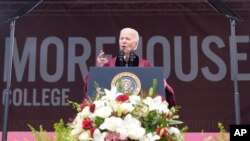
President Joe Biden on Sunday told the graduating class at Morehouse College that he heard their voices of protest over the Israel-Hamas war, and that scenes from the conflict in Gaza have been heartbreaking.
"I support peaceful nonviolent protest," he told students, some who wore keffiyeh scarves around their shoulders on top of their black graduation robes. "Your voices should be heard, and I promise you I hear them."
The president told the crowd that it was a "humanitarian crisis in Gaza, that's why I've called for an immediate cease-fire to stop the fighting" and bring home the hostages taken when Hamas attacked Israel on Oct. 7. The comments, toward the end of his address that also reflected on American democracy and his role in safeguarding it, were the most direct recognition to U.S. students about the campus protests that have swept across the country.
Morehouse's announcement that Biden would be the commencement speaker drew some backlash among the school's faculty and supporters who oppose Biden's handling of the war. Some Morehouse alumni circulated an online letter condemning school administrators for inviting Biden and soliciting signatures to pressure Morehouse President David Thomas to rescind it.
The letter claimed that Biden's approach to Israel amounted to support of genocide in Gaza and was out of step with the pacifism expressed by Martin Luther King Jr., Morehouse's most famous graduate.
The Hamas attack on southern Israel killed 1,200 people. Israel's offensive has killed more than 35,000 Palestinians in Gaza, according to local health officials.
Some members of the graduating class showed support for Palestinians in Gaza by tying keffiyeh scarves around their shoulders on top of their black graduation robes. One student draped himself in a Palestinian flag. On the stage behind the president, academics unfurled a Democratic Republic of Congo flag.
The country has been mired in an ongoing civil war that has plunged the nation into violence and displaced millions of people. Many racial justice advocates have called for greater attention to the conflict and for greater attention in the US to the conflict as well as American aid in ending the violence.
"Thank you God for this 'woke' class of 2024 that is in tune with the zeitgeist, the spirit of the times," the Rev. Claybon Lea Jr. said during a prayer at the start of the commencement.
The class valedictorian, DeAngelo Jeremiah Fletcher, said at the close of his speech that it was his duty to speak on the war in Gaza and that it was important to recognize that both Palestinians and Israelis have suffered.
"From the comfort of our homes, we watch an unprecedented number of civilians mourn the loss of men, women and children, while calling for the release of all hostages he said. "It is my stance as a Morehouse man, nay as a human being, to call for an immediate and permanent cease-fire in the Gaza Strip."
Biden stook and shook his hand after Fletcher finished.
The speech, and a separate one Biden is giving later Sunday in the Midwest, is part of a burst of outreach to Black constituents by the president, who has watched his support among these voters soften since their strong backing helped put him in the Oval Office in 2020.
After speaking at Morehouse in Atlanta, Biden will travel to Detroit to address an NAACP dinner.
Georgia and Michigan are among a handful of states that will help decide November's expected rematch between Biden and Republican former President Donald Trump. Biden narrowly won Georgia and Michigan in 2020 and needs to repeat — with a boost from strong Black voter turnout in both cities.
Biden spent the back end of the past week reaching out to Black constituents. He met with plaintiffs and relatives of those involved in Brown v. Board of Education, the landmark 1954 Supreme Court decision that outlawed racial segregation in public schools. He also met with members of the "Divine Nine" Black fraternities and sororities and spoke with members of the Little Rock Nine, who helped integrate a public school in Little Rock, Arkansas, in 1957.
In Detroit, Biden was set to visit a Black-owned small business before delivering the keynote address at the NAACP's Freedom Fund dinner, which traditionally draws thousands of attendees. The speech gives Biden a chance to reach thousands of people in Wayne County, an area that has historically voted overwhelmingly Democratic but has shown signs of resistance to his reelection bid.
Wayne County also holds one of the largest Arab American populations in the nation, predominantly in the city of Dearborn. Leaders there were at the forefront of an "uncommitted" effort that received over 100,000 votes in the state's Democratic primary and spread across the country.
A protest rally and march against Biden's visit are planned for Sunday afternoon in Dearborn. Another protest rally is expected later that evening outside Huntington Place, the dinner venue.
US remains top choice for Indian students going abroad
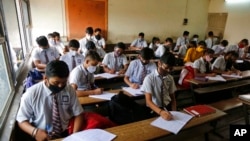
About 69% of Indian students traveling abroad for their studies chose the United States, according to a Oxford International’s Student Global Mobility Index. Other popular choices were the United Kingdom, Canada and Australia.
Education Times reports the main influencers for deciding where to study abroad – for Indian students and others – were parents. (April 2024)
Malaysian official: Schools can’t turn away from global tensions
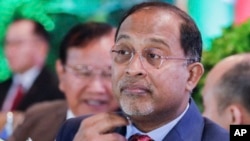
Zambry Abdul Kadir, Malaysia’s higher education minister, said protests spreading across universities in the United States show that schools can’t ignore political tensions.
Helen Packer, reporting in Times Higher Education, said the minister reminded educators that universities are key in the development of leaders, individuals and societies. (April 2024)




